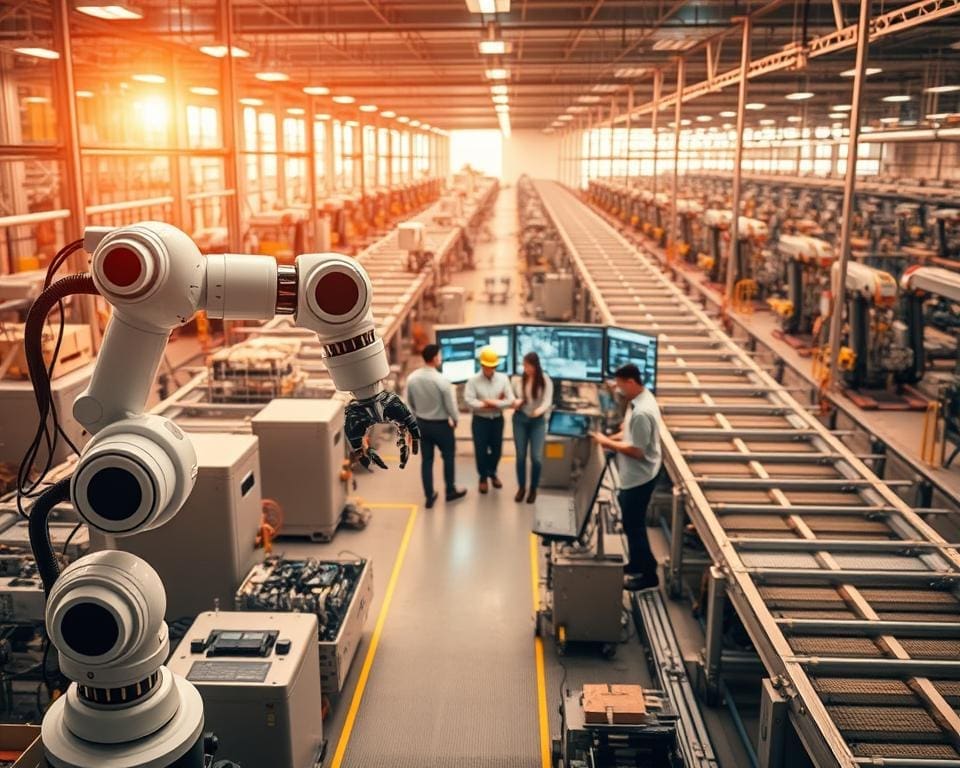The integration of Artificial Intelligence (AI) in factories represents a pivotal moment in the evolution of the manufacturing sector. As industries across the United Kingdom embrace AI technology in manufacturing, they are witnessing a profound manufacturing transformation. This shift not only enhances operations but also reshapes the very fabric of factory automation. The question of how AI influences factory operations is paramount, as UK manufacturers leverage these intelligent systems to increase productivity and efficiency. In the following sections, we will explore the numerous ways in which AI is redefining manufacturing and setting a foundation for sustainable advancements.
The Evolution of Manufacturing: A Brief Overview
The evolution of manufacturing has been marked by significant changes in production techniques, beginning in the late 18th century with the Industrial Revolution. This period sparked a series of innovations that transformed factory operations and reshaped the landscape of industry.
Historical Context of Factory Operations
The history of factories indicates a profound transformation in how goods were produced. Before the advent of factories, manufacturing predominantly took place in small workshops or homes. The introduction of mechanisation changed everything, allowing for the production of goods on a much larger scale. With innovations like the steam engine, factories could operate more efficiently and increase output dramatically. This historical overview reveals how early factories paved the way for future advancements in manufacturing.
Introduction of Technology in Manufacturing
Technological advancements in manufacturing reached new heights during the 20th century. Automation began to take hold, with the emergence of Computer-Aided Design (CAD) and Computer Numerical Control (CNC) machines. These manufacturing innovations streamlined design processes and improved precision in production. As manufacturing capabilities grew, so too did the complexity of operations, setting the stage for the contemporary integration of AI into factories, a natural progression in the ongoing evolution of manufacturing.
The Role of AI in Modern Factories
AI is fundamentally transforming the operational dynamics within modern factories. The integration of AI solutions in production not only enhances efficiency but also introduces innovative approaches to traditional manufacturing processes. Notable advancements include AI-powered robotics and automation, along with predictive maintenance capabilities, which are proving essential for smart factories striving for excellence.
AI-Powered Robotics and Automation
In the world of automation in manufacturing, companies like FANUC and KUKA are leading the charge. These innovators are leveraging AI robotics to develop machines that can perform tasks with remarkable precision and speed. This evolution in robotics enables factories to operate seamlessly, significantly reducing human error while enhancing output quality. The ability to adapt and learn from various operational scenarios positions these systems as vital assets within smart factories.
Predictive Maintenance through AI
Predictive maintenance represents a crucial advantage provided by AI technologies. By utilising advanced algorithms, factories can monitor equipment health in real time, identifying potential failures before they manifest. This proactive approach allows for timely interventions, thereby minimising downtime and extending the lifespan of machinery. Implementing such AI solutions in production can drastically lower maintenance costs and streamline operations, creating a more robust manufacturing environment.
How is AI changing the way factories operate?
Factories are undergoing a remarkable transformation due to the integration of artificial intelligence. One significant change revolves around AI’s potential in enhancing efficiency and reducing waste. With data-driven insights, manufacturers can now implement strategies that lead to streamlined operations, resource optimisation, and decreased costs associated with excess materials and erroneous processes. Companies embracing lean manufacturing principles leverage AI to identify inefficiencies that may not have been evident before.
Enhancing Efficiency and Reducing Waste
Manufacturers are increasingly recognising the impact of AI efficiency on their operations. By applying advanced algorithms, AI tools help optimise production schedules and minimise downtime. Companies such as Toyota have documented significant progress in their production lines by utilising AI in real-time decision-making. These strategies have proven effective for reducing manufacturing waste, enabling factories to operate within tighter margins while enhancing output quality.
Streamlining Supply Chain Management
In addition to production enhancements, AI plays a crucial role in the supply chain. Through real-time analytics and demand forecasting, manufacturers can anticipate market changes swiftly and accurately. This innovation contributes to efficient factory operations by ensuring that resources align precisely with needs. The implementation of AI in supply chain processes solidifies a manufacturer’s ability to mitigate risks and respond to challenges with agility, paving the way for future growth.
Benefits of Implementing AI in Manufacturing Processes
The integration of AI into manufacturing processes provides a wealth of advantages that can significantly transform operations. Businesses are witnessing remarkable improvements in efficiency and quality, leading to notable shifts in their production landscapes.
Improved Production Rate and Quality Control
The benefits of AI in manufacturing manifest prominently through production rate improvement and enhanced quality control automation. Industry leaders such as Siemens have successfully adopted AI systems to optimise workflow, maximising output while minimising downtime. AI models work tirelessly to monitor production lines, ensuring consistent quality, where machine learning can identify defects at various stages, allowing for rapid responses and corrections.
Data-Driven Decision Making
Utilising data analysis in factories empowers manufacturers to make informed decisions regarding their operations. AI systems analyse vast datasets, offering insights that drive manufacturing decisions. This ability to harness data not only streamlines processes but also fosters a culture of continuous improvement. With informed strategies rooted in AI analytics, businesses can position themselves favourably in an ever-evolving marketplace, enhancing their competitive edge.
Challenges Faced by Factories in Adopting AI
The journey of integrating AI technologies within factories presents notable hurdles that demand careful navigation. Understanding these challenges of AI adoption can significantly impact a factory’s approach to enhancing operational efficiency. Key obstacles include initial investment and costs, alongside the critical aspect of employee training and adaptation.
Initial Investment and Costs
Many factories face substantial manufacturing costs when considering the implementation of AI systems. The initial investment in AI can be sizeable, with various components such as software, hardware, and infrastructure requiring financial commitment. Reports indicate that manufacturers must be prepared for a budget that may extend beyond initial projections. This financial hurdle often creates a barrier for smaller businesses, limiting their ability to compete in a rapidly evolving market.
Employee Training and Adaptation
Alongside financial challenges, employee training in AI remains a crucial factor in the successful adoption of these technologies. Resistance to change can hinder progress, necessitating a structured approach to employee training in AI. Comprehensive training programs are essential, empowering staff to smoothly transition into roles that work alongside AI systems. The adaptation to AI technologies requires not only technical skills but also a mindset that embraces innovation and continuous improvement.
The Future of AI in Factories: Trends to Watch
The future of AI in manufacturing is poised for revolutionary advancements, particularly with the emergence of autonomous systems. These innovations promise to redefine trends in factory automation, allowing for more agile and responsive production environments. As companies increasingly adopt AI, they unlock new capabilities, such as self-managing supply chains that optimise workflow efficiency and responsiveness to market demands.
AI-driven analytics will play a crucial role in the operational landscape of factories, enabling data insights that facilitate hyper-customisation of products. This shift goes beyond mere efficiency; it empowers manufacturers to tailor their offerings to meet specific customer desires, thereby enhancing satisfaction and loyalty. With augmented reality (AR) increasingly integrated into factory settings, workers can benefit from immersive training experiences and real-time support, significantly boosting both productivity and safety standards.
Collaborative robots, or cobots, are also becoming a staple in modern manufacturing, showcasing the importance of synergy between humans and machines. Companies like Universal Robots have pioneered in this area, demonstrating that the future technologies in factories can harmoniously blend human expertise with robotic precision. Those organisations that embrace these AI innovations with an eye towards technological foresight are not just adapting; they are leading the charge in operational excellence, shaping a vibrant future in the dynamic world of manufacturing.









